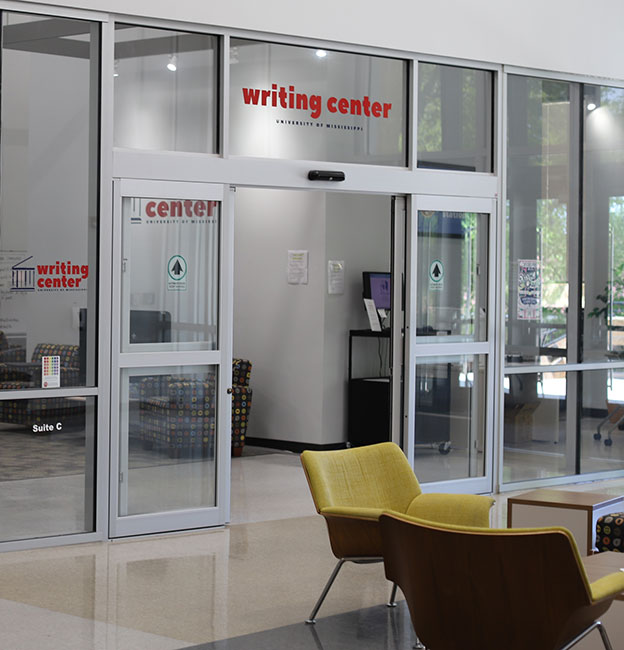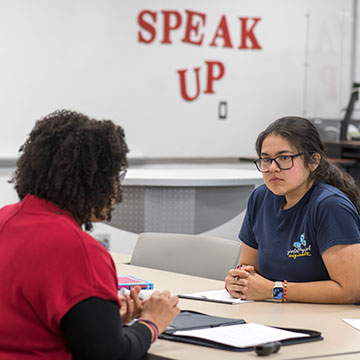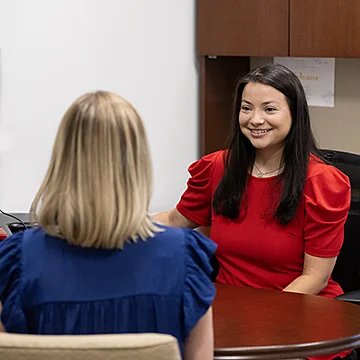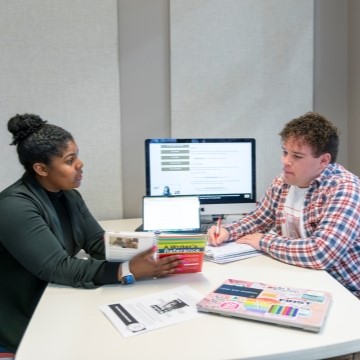Resources & Scholarships in Writing and Rhetoric
We are committed to student success by providing a variety of support and resources to achieve your goals.

The Tools for Success
Find out about the generous scholarship opportunities for writing and rhetoric students and student success resources available at the department, college, and university levels.
Learn about our many research opportunities for students within the classroom and beyond. For example, the Department of Writing and Rhetoric administers and publishes Venture: The UM Undergraduate Research Journal, a yearly double-blind, peer-reviewed journal of research written by UM students from all disciplines. The journal is a student-led publication featuring an undergraduate editorial board with support from DWR faculty mentors.
Students also have the opportunity to work as peer consultants at the Writing Centers and the Speaking Center. These campus centers offer free one-on-one consultations, group workshops, and other writing and speaking resources so that students can strengthen their skills and become independent, effective, and confident communicators.
Scholarship & Awards
Find out if you're eligible for our scholarship and awards given by the Department of Writing & Rhetoric.
Eligibility:
- Full-time student
- Major in Rhetoric, Writing, and Speech Communication
- Sophomores or juniors
- First preference for Mississippi residents
- Financial need (FAFSA required)
Application process:
- Contact department
- Faculty committee
About Reba McCullouch Greer and Lance Greer:
Reba McCullouch Greer graduated from the University of Mississippi in 1963 with a bachelor’s degree in English, which prepared her for work in Georgia, California, New York and Maryland. As a teacher, school administrator and central office supervisor in Virginia, she developed programs to help K-12 students understand and apply their writing and research process to create hypothesis-based text. Reba and Lance Greer, whose commitment to literacy and the Department of Writing and Rhetoric is fundamental, established the scholarship.
Established in 1990, the Cynthia Krieser Award memorializes a brilliant life tragically cut short. Honoring Cynthia’s love of writing, the award is presented for Outstanding Freshman Writing. A panel of W&R instructors reviews and selects the winner from the nominations.
This annual award is open to all students with freshman status in WRIT 100/101 or WRIT/LIBA 102 courses during the calendar year. Work should be submitted that was completed during the student’s freshman year, even though they may no longer be a freshman student at the time of the award selection. Nominations may be made by individual students and/or DWR teachers of record for coursework submitted by one of their freshman students.
Recipients of the Cynthia Krieser Award for Outstanding Freshman Writing will have their names added to the award plaque on display at the Department of Writing and Rhetoric; they will also receive a commemorative award and $400.00 (processed through the student’s University bursar account).
Established in 2020, the JoAnn Edwards Speech Award recognizes undergraduate students who demonstrate the highest ability and overall effectiveness in public speaking. This award is presented annually to the winners of the JoAnn Edwards Speech Competition. Recipients of this award will have their names added to a plaque on display in the Department of Writing & Rhetoric. They will also receive a commemorative award and a monetary scholarship (processed through the student’s University bursar account).
The Creed characterizes the University of Mississippi as “a community of learning dedicated to nurturing excellence in intellectual inquiry and personal character in an open and diverse environment.” As part of that mission, the UM Common Reading Experience helps students develop a sense of community among diverse peers, neighbors, and instructors, while making connections across varied ideas, experiences, and disciplines. The CRE Diverse Voices Essay Challenge provides an opportunity for students to further engage with that mission by examining issues related to the common book.
While the Common Read is a text provided to incoming freshmen, we encourage participation from all UM undergraduate students. Each year, the prompt is inspired by the text. However, your essay should not be about the text. Therefore, even students who have not read the text are able to participate.
Essay rules
- The annual challenge is open to all UM undergraduate students.
- One winner and two finalists will be chosen by a panel of judges.
- The winner will receive a $400 scholarship, awarded through the student’s bursar account.
- Entries must be submitted through the online portal.
- The deadline to submit is December 31, 2024, with the winners and finalists announced in March 2025.
- Note that there isn’t a length requirement. As the writer, you would decide how long the essay needs to be to effectively answer the prompt.
The Bae Magruder Consultant of the Year Award recognizes an undergraduate or graduate consultant who has provided outstanding service as a writing consultant at one of the University of Mississippi’s Writing Centers. The award acknowledges excellence in tutoring, exemplary peer support, an outstanding tutoring philosophy, continued professional development, and positive student evaluations.
Anyone may nominate a consultant for the award. Self-nominations are also encouraged. Nomination deadline for 2023 award: Monday April 1
Established in 1986 in memory of X. A. Kramer, Jr., the Kramer Outstanding Teaching Award is presented annually to a DWR composition instructor for outstanding teaching. Congratulations to current and past recipients of this award!
In memory of Kevin Malloy, a member of our Speech faculty who lost his life in 2020, the Kevin Malloy Award for Outstanding Teacher of Public Speaking acknowledges a Speech faculty member who has demonstrated exceptional dedication to their students both in and out of the classroom. In honor of Kevin’s work with his own students, recipients of this award are recognized for encouraging student development of public speaking skills, building student confidence in a supportive environment, and promoting student opportunities for showcasing their skills. Recipients also exhibit innovative teaching strategies and work as active members of the department to continue a tradition of excellence in teaching.
Venture: The UM Undergraduate Research Journal
Venture: The UM Undergraduate Research Journal is a yearly double-blind, peer-reviewed publication of research written by UM students from all disciplines. The journal is a student publication featuring an all undergraduate editorial board with support from a team of graduate student advisors.
We provide an opportunity for students to experience the review and publication process firsthand. “Venture” embodies what we think drives new and dynamic scholarship: the courage to take risks, explore the unknown, and chart a new path.
Faculty Advisor: Dr. Claire Mischker, Editor-in-Chief: William Bittner, Sciences Editor: Thomas Dyminski, Humanities Editor: Reagan Allen, Social Sciences Editor: William Bittner
Our journal takes its name from two previously separate publications at the University of Mississippi. In 2009, the Department of Writing and Rhetoric launched Venture, a magazine showcasing freshman student writing, especially creative works of prose, poetry, and art. The original Venture ran until 2013.
In 2015, Whitney Greer, a UM Writing Center consultant, created the University of Mississippi Undergraduate Research Journal (UMURJ) to provide an outlet for undergraduate researchers to publish their work. The Associated Student Body recognized the importance of this endeavor and fully sponsored the journal for its first two years of publication. The journal continued until 2019. Sadly, during the COVID-19 pandemic and temporary shift to online and remote learning that followed, previous editors graduated and publishing the journal became very difficult.
In Fall 2021, a group of students and faculty decided to revive these efforts to celebrate excellence in undergraduate student scholarship by combining Venture and the UMURJ. Today, we are a registered student organization housed in the UM Writing Centers, with generous support from the Office of Research and Sponsored Programs as well as the Department of Writing and Rhetoric.
Eligibility
- The primary author of the manuscript must be an undergraduate student enrolled at the University of Mississippi.
- The submitted manuscript must contain original research.
- No simultaneous submissions, please.
Requirements
Research Manuscripts:
- Submissions should not exceed 25 pages (excluding references).
- Submit your work as a single Microsoft Word (.docx) file (unless your research requires a different format for tables, mathematical notations, or figures).
- Format your writing in 12-pt Times New Roman font and double-spaced text.
- Include page numbers on each page of your document.
- Any discipline appropriate citation style (MLA, APA, Chicago, etc.) may be used as long as it is correct and consistent throughout the entire document.
Authors should be prepared to provide the additional information:
- Contact Information
- Area of Research
- Citation Style Format
- Brief abstract (200 words maximum) and author bio (100 words maximum), required on submission form
Submission process
- You submit the manuscript via Google form (linked below).
- The Editor-in-Chief and the Academic Advisor will review the manuscript to see if it warrants further review.
- If so, it will be distributed to the appropriate subject editor, who will assign it to a group of peer reviewers (Social Sciences, Humanities, or STEM).
- Following peer review, a subject editor will look over the feedback and discuss the manuscript with the academic advisor, the other editors, and the Editor-in-Chief.
- The manuscript will either be accepted, accepted with the expectation of revision, or not accepted.
- If “accepted with revision,” you will have a specified amount of time to revise your
Further expectations:
- Primary authors must be willing to follow through with editors by revising their publications in a timely manner.
- Author(s) must consent to publication if their manuscript is selected for publication.
- Author(s) should respond to inquiries from Venture editorial staff in a timely manner.
Student Success Resources
Support Centers

Writing Centers
We offer free writing consultation services for UM students. Our highly trained peer consultants work alongside UM students on projects in all disciplines at any stage of the composition process. Our centers provide access to free one on one consultations, group workshops, and other writing focused resources. Our services are delivered face to face and in online platforms through our multiple campus locations in Oxford, Tupelo, and DeSoto. We work to help UM students cultivate individualized strategies for becoming independent, effective, and confident writers.

Speaking Center
We offer free public speaking consultation services for UM students. Our highly trained peer consultants work alongside UM students on projects in all disciplines. We provide free access to one-on-one consultations, group workshops, and other speech communication-focused resources. Our services are delivered face-to-face and online. We cultivate individualized strategies with UM students to help them become independent, effective, and confident speakers.
Quality Enhancement Plan (QEP)
The Quality Enhancement Plan of 2009 encourages all faculty to regard the teaching of writing—or “the ways of knowing” a discipline–as fundamental to teaching their subject area. Not only does writing take different forms in the humanities, in the sciences, in journalism, business, medicine, and law, but the methods of inquiry, the conventions of evidence, and the modes of presentation differ significantly, even as some of the basic elements of writing remain the same. This means that faculty in the disciplines are best suited for teaching students how to think like, argue like, and write like members of a given field.
The Department of Writing & Rhetoric is pleased to announce the launch of two new programs as part of the university’s Quality Enhancement Plan (QEP): Graduate Writing Fellowships and Faculty Seed Grants. One of the goals of the university’s 2009 Quality Enhancement Plan (QEP) is to encourage faculty to integrate writing into the curriculum in ways that teach students not only that writing styles and discourse conventions differ by discipline, but also that writing itself is inseparable from the “ways of knowing” of a particular discipline. Thus, students must learn to think like members of their field—understanding the methods of inquiry, the conventions of evidence, and the modes of expression expected. Critical thinking is inextricably linked with the ability to write effectively in any field, and students need both reinforcement of the general principles of writing that cross all disciplines and explicit instruction in the writing in their majors.
Such pedagogical goals require a commitment of time and energy from faculty, and in many cases additional professional development in writing pedagogy. In order to build a culture where writing is considered the normal way of learning any subject, faculty will be encouraged to pursue professional development opportunities and the support of trained Graduate Writing Fellows.
To enrich a curriculum with writing is to help students come to understand what composition scholar Judith Langer calls “the ways of knowing” a subject area. As Langer puts it:
“There is another way to view academic learning, however, that transforms the role of writing in schooling. This is to view the classroom as a community of scholars (or of scholars and apprentices) that has its own public forums, with associate rules of evidence and procedures for carrying discussion forward. Students must learn, then, not only the basic facts around which discussion is structured but the appropriate and inappropriate ways in which those facts can be presented in the forum defined by that classroom... Writing (and the thinking that accompanies it) then becomes a primary and necessary vehicle for practicing the ways of organizing and presenting ideas that are most appropriate to a particular subject area.”
Moreover, extensive research tells us that:
- Writing increases student engagement, teaches critical thinking and problem solving skills, and deepens learning of subject matter, the “content” of any course.
- Writing teaches discipline-specific ways of thinking and communicating that are important to performance in university courses and in post-university professions.
- Teaching writing in math, science, or art means interpreting and guiding the writing process and responding to student work in productive and helpful ways that encourage revision.
The Graduate Writing Fellows Program was launched in spring of 2013 to support the teaching of undergraduate writing across all disciplines. Fellows are selected on a competitive basis and are required to satisfactorily complete a graduate level writing pedagogy class, WRIT 671. Their pay is commensurate with the teaching (or teaching assistantship) of one class.
Each Graduate Writing Fellow is attached to one or more courses per semester and is charged with two interrelated tasks:
- Support faculty in the development of effective writing assignments
- Support students during the brainstorming, drafting, revising, editing, and proofreading stages of the writing process
Graduate Writing Fellows will sometimes attend the classes to which they are attached, but they spend most of their time meeting with students in one-on-one or group consultation sessions, assisting these students in writing associated with the course. The Fellows are not to participate in grading and will never report on student performance to the professor. In other words, this service is NOT tied to student evaluation in any way. Instead, this service is stubbornly student-centered and delivers the benefits of co-curricular tutoring directly to students in the context of their major courses. Graduate Writing Fellows will become familiar with the goals and outcomes of the course, the writing assignments, the criteria for evaluation, and the basics of the subject matter. The major professor of the course will meet with the Graduate Writing Fellow to discuss course expectations and assignments and to provide course materials. At the end of the course, the professor will be asked to submit a post-fellowship report to the Department of Writing and Rhetoric.
A committee representing multiples disciplines evaluates applications, considering a candidate’s letter of interest, a writing sample, and a faculty letter of recommendation.
Along with this course-focused support for writing in the disciplines, the program will develop a cadre of graduate student ambassadors from various fields who will model effective writing to their graduate-level colleagues and to undergraduate majors in the fields.
Faculty may also use seed grant funding to participate in a semester-long faculty seminar to develop or improve a writing-enriched course, in which case the grant would serve as a stipend to compensate for the extensive time commitment involved. The faculty seminar will be offered each semester for up to 10 participants who will meet weekly for approximately one hour. Participants must teach the writing-enriched course within the next academic year and write a brief report discussing the changes they have made to their courses. Reports and related material will be made available to their peers either online or at a public forum to be determined by participants and the Department of Writing and Rhetoric.



